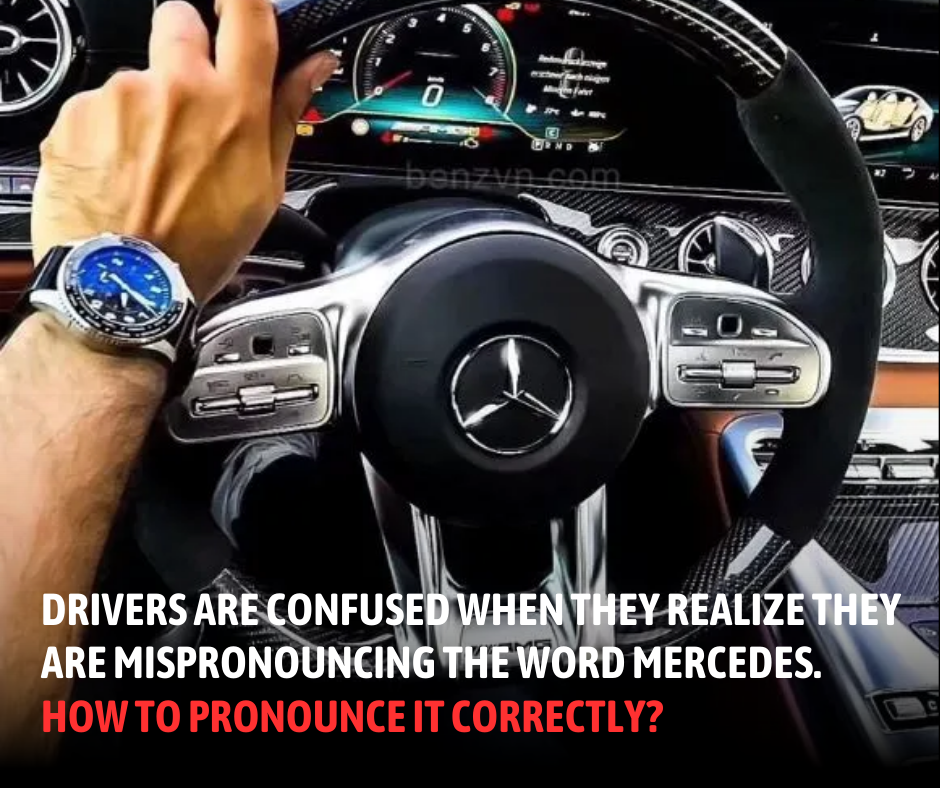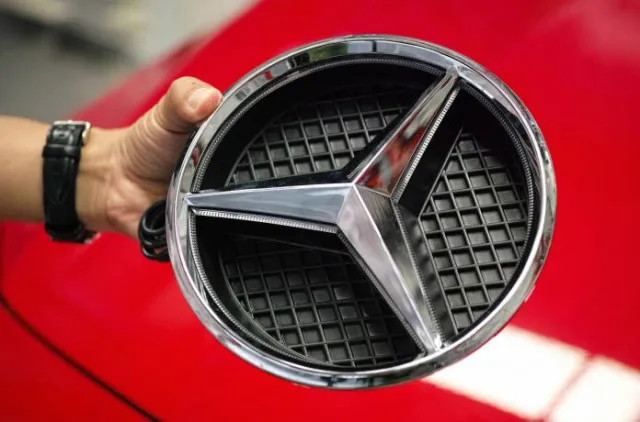Mercedes-Benz is a name synonymous with luxury, style, and innovation. However, a recent study has revealed that many people have been mispronouncing this iconic car brand for years.
As drivers discovered this surprising fact, social media buzzed with reactions and debates over the true pronunciation of “Mercedes.” In this article, we’ll explore the origins of the brand name, its proper pronunciation, and why it’s such a common mistake.

The Origin of the Mercedes Name
The story of Mercedes-Benz dates back to 1926 when the brand was officially founded through the combined efforts of Karl Benz, Gottlieb Daimler, Wilhelm Maybach, and Emil Jellinek. The name “Mercedes” was chosen as a tribute to Jellinek’s daughter, Mercedes Jellinek. The name quickly became iconic in the automotive world, yet its pronunciation has left many people puzzled.
For nearly a century, Mercedes has grown into a leading luxury car brand, but the correct way to say its name remains unknown to many, even among its dedicated fans.
Common Mispronunciations of Mercedes
According to a study by Saga Car Insurance, a staggering 80% of people do not pronounce “Mercedes” correctly. Many English speakers say “Mer-say-deez,” which has become a widely accepted pronunciation outside of Germany. However, this English adaptation differs from the German pronunciation, which is closer to “Mertz-saydez.”

On social media platforms like Twitter and Reddit, users shared their own interpretations, with some suggesting “Mur-Say-Deez” or even “Mair-they-dayth.” While these attempts vary, the study highlighted just how confusing this name has become, leading to debates and surprise reactions among drivers.
Social Media Reactions: A Mix of Shock and Amusement
After learning about the pronunciation issue, social media users shared their thoughts and experiences. One user commented, “I’ve always said it like ‘Mer-say-deez,’ and I don’t think I’ll change!” Another noted, “My German friends always said it like ‘Mertz-saydez,’ but it feels weird in English.”
The study even sparked discussions around cultural pronunciation differences, with some drivers expressing a desire to adopt the original German pronunciation. Others, however, felt attached to the English adaptation they’d grown up with.
Understanding the Correct German Pronunciation
In German, “Mercedes” is pronounced more closely to “Mertz-saydez.” The key difference lies in the first syllable, which carries a softer “Mertz” sound rather than the “Mer-say” many English speakers use. The proper German pronunciation captures the heritage of the brand and respects its roots, yet it can feel unfamiliar to non-German speakers.

A video featuring Mercedes-Benz CEO Ola Källenius further sparked debate when viewers noticed that his pronunciation leaned toward the English version. The video highlighted the brand’s history and emphasized its legacy but left some viewers confused about whether there was a single “correct” way to say “Mercedes.”
The Popularity of Mercedes Despite Pronunciation Confusion
Regardless of how people pronounce it, Mercedes-Benz remains one of the most recognizable car brands globally. The Saga survey also found that Mercedes has the second most recognized car logo, with its iconic three-pointed star etched into the minds of drivers worldwide.
Remarkably, 50% of participants could recall the brand’s logo, while 88% accurately sketched it when prompted.
Additionally, an impressive 83% of Brits in the study could spell “Mercedes-Benz” correctly, further showcasing the brand’s influence. Though the pronunciation may be a challenge, the brand’s familiarity and status are undeniable.
Why Do People Mispronounce Mercedes?
There are several reasons why people mispronounce “Mercedes,” from cultural differences to the adaptation of foreign words into English. As the name has become widely popular, the English-speaking world developed its own pronunciation that deviates from the German origin. Additionally, many people have never been exposed to the correct pronunciation, as they primarily hear “Mer-say-deez” in movies, ads, and everyday conversations.
The pronunciation confusion also reflects how languages adapt names and terms, with many foreign brands experiencing similar shifts in pronunciation as they reach international markets.
Fun Facts About the Mercedes Brand
Apart from its luxury and reputation, Mercedes has several fascinating aspects tied to its name and history:
- Naming After Family: Emil Jellinek’s daughter, Mercedes Jellinek, inspired the brand’s name. Naming a brand after a loved one adds a personal legacy to its history.
- Symbolic Logo: The three-pointed star logo represents the brand’s ambition to dominate land, sea, and air, showcasing the company’s far-reaching aspirations.
- Global Recognition: The brand’s reach is so extensive that even with pronunciation discrepancies, it remains universally recognizable.
Lessons from the Mercedes Pronunciation Debate
This ongoing debate serves as a reminder of how languages and cultures shape the way we interpret and adapt names. It also reflects the flexibility of brand identity, showing that even a luxury brand like Mercedes can have varying representations around the world. While the original German pronunciation is more accurate, the English adaptation has become an accepted part of the brand’s identity in global markets.

For fans of the brand, learning the correct pronunciation can be a fun way to connect more deeply with its heritage. However, it’s clear that regardless of pronunciation, Mercedes-Benz continues to stand out as a symbol of luxury and innovation.
How to Pronounce Other Iconic Car Brands
Mercedes is not the only car brand with pronunciation challenges. Here are a few other luxury brands and their correct pronunciations:
- Porsche: Correctly pronounced as “Por-shuh,” not “Porsh.”
- Lamborghini: Pronounced “Lam-bor-GEE-nee,” with emphasis on the “GEE.”
- Bugatti: Pronounced “Boo-GA-tee,” with a soft emphasis on the first syllable.
Learning these pronunciations not only enhances car enthusiasts’ knowledge but also pays respect to the brand’s cultural origins.
Conclusion: A Name with Global Impact
The revelation that most people mispronounce “Mercedes” has sparked curiosity and conversation worldwide. As drivers continue to engage with the brand, it’s fascinating to see how the name adapts across different languages and regions.
Although the true pronunciation is “Mertz-saydez,” the brand’s success transcends linguistic boundaries, making it a symbol of luxury and excellence worldwide.
Mercedes-Benz’s legacy extends far beyond its name, representing innovation, elegance, and prestige. So, whether you say “Mer-say-deez” or “Mertz-saydez,” the brand remains a leader in the luxury automotive world, recognized and celebrated by millions.








